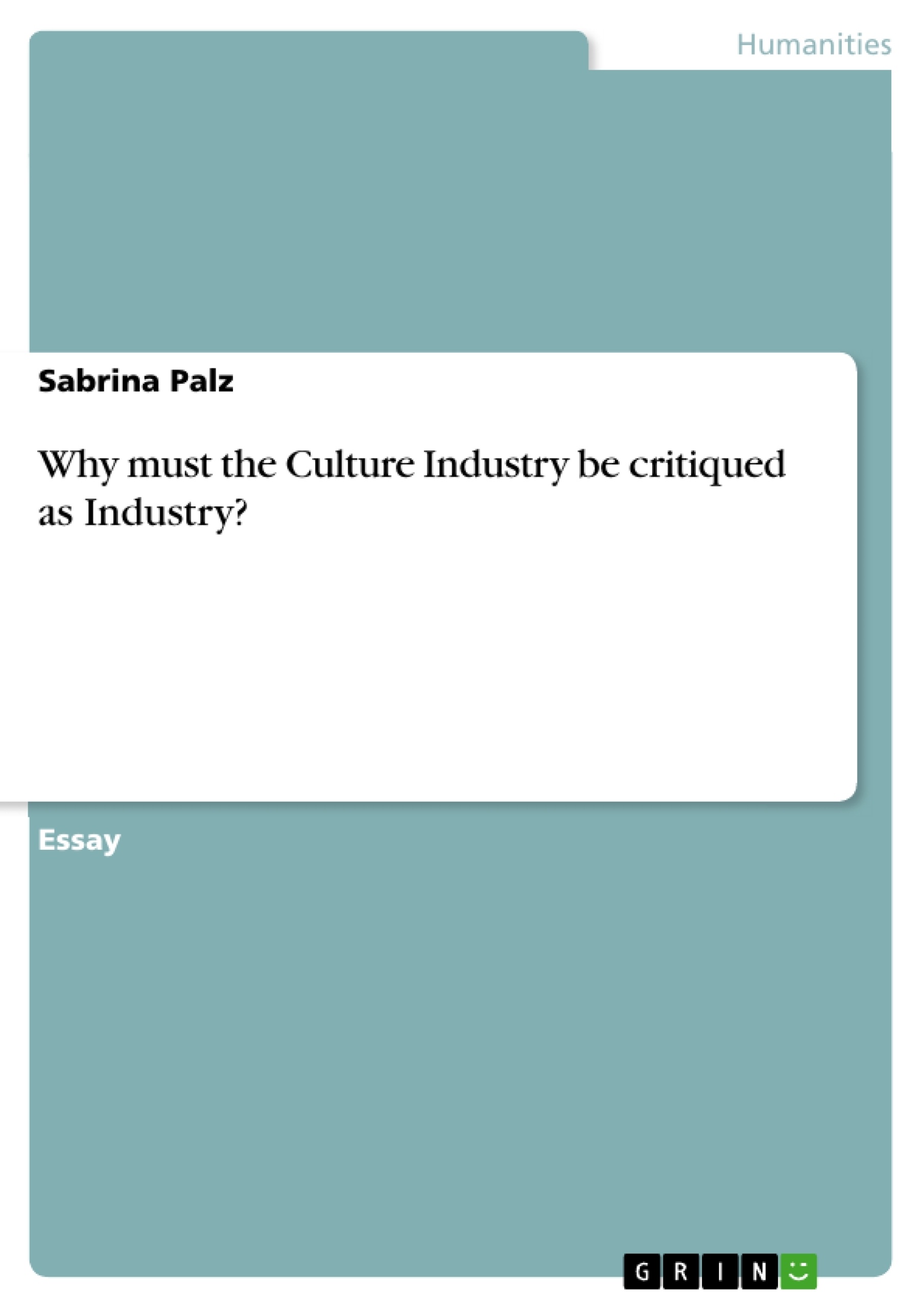Looking at the Western World today, one has to say that we are living in a capitalist, consumption striving, mass-medially educated society. This structure can be summarized, besides others, by the term “Culture Industry”, an expression first used by Theodor W. Adorno. The German social theorist criticised the developments he experienced by the midst of the 20thcentury; not only was he claiming that the society in general was a product of the capitalist ideology, but in particular it was the mass media on which he focused his critique as the media was conveying the destructive ideology of the culture industry.
This essay will provide a critical analysis of the critique of the Frankfurt School, of which Adorno was a member, and a discussion whether it is justified tocriticize the culture industry as an industry, and why.
First, it will be necessary to give a definition of the culture industry and to compare this to the traits of what defines an industry in general. In the following chapter on culture Adorno’s pessimistic view will be explained. For him, the idea of enlightenment, which means the overcome of ancient beliefs, myths and lack of knowledge, was formerly brought forward through art and culture. In the wake of the Nazi regime Adorno felt that this mission has failed, and thus there was no hope for the human race to ever see the truth. Today anthropologists in particular claim that the mass media gives a false impression of the world.
While Adorno embedded his critique of the mass media in a general social theory, this essay will be restricted to the former; nonetheless there will be three distinctive levels on which the issue will be reflected: the economic aspect, the social side and the political perspective, which cannot be separated from the mass media system. This essay will also point to the limitations of Adorno’s critique, thereby defending the culture industry. The final chapter is supposed to give an answer to the key question.
Table of Contents
- Introduction
- The Culture Industry – a Definition
- Modern Culture
- The industrial character of the culture industry..
- The abolishment of culture...
- Different approaches.......
- The political perspective......
- Social side........
- The music industry - a short excursus
- Minorities and Niche markets
- Anthropology and the Culture Industry..
- Defence of the culture industry
- Conclusion.
- Reference .....
Objectives and Key Themes
This essay provides a critical analysis of the critique of the Frankfurt School, of which Adorno was a member, and a discussion whether it is justified to criticize the culture industry as an industry, and why.
- The definition of the culture industry and its capitalist character
- The critique of the culture industry and its impact on enlightenment
- The different perspectives on the culture industry: economic, social, and political
- The limitations of Adorno's critique and the defense of the culture industry
- The role of mass media in shaping modern society
Chapter Summaries
The essay begins by defining the culture industry as characterized by its capitalist spirit and aim to blind the masses. It explores Adorno's pessimistic view of the culture industry, arguing that it has undermined the potential for enlightenment through art and culture.
The essay then delves into the different approaches to understanding the culture industry, including the economic, social, and political perspectives. It examines the role of the music industry as an example of the culture industry's impact on social structures and its exploitation of minorities and niche markets.
Finally, the essay acknowledges the limitations of Adorno's critique and argues in favor of the culture industry, concluding with a discussion of the relationship between anthropology and the culture industry.
Keywords
The main keywords and focus topics of the essay include the culture industry, capitalism, mass media, enlightenment, critical theory, Frankfurt School, Adorno, Bourdieu, McLuhan, social theory, economic determinism, political economy, music industry, minorities, niche markets, and anthropology.
Frequently Asked Questions
What does the term "Culture Industry" mean according to Adorno?
The term, coined by Theodor W. Adorno, describes how modern culture and mass media function like an industry, producing standardized goods to manipulate society and maintain capitalist ideology.
Why did Adorno critique the mass media?
He believed mass media conveys a destructive ideology that blinds the masses, prevents critical thinking, and undermines the potential for true enlightenment through art.
What is the relationship between the Culture Industry and capitalism?
The Culture Industry is seen as a product of capitalist ideology, where culture is commodified and profit-seeking becomes the primary goal of artistic production.
How does the Culture Industry affect niche markets and minorities?
The essay discusses how the industry exploits niche markets and minorities, often turning diverse cultural expressions into standardized, marketable products.
Are there limitations to Adorno's critique?
Yes, the essay acknowledges limitations to Adorno’s pessimistic view and offers a defense of the culture industry, suggesting it may have more complex social functions than he assumed.
- Arbeit zitieren
- Sabrina Palz (Autor:in), 2005, Why must the Culture Industry be critiqued as Industry?, München, GRIN Verlag, https://www.grin.com/document/61830



